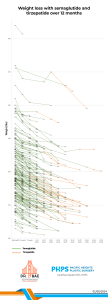You wake up one night with abdominal pain that starts around your navel (“belly button”) and within a few hours it moves to the lower right section of your abdomen. The pain is so significant that you can’t go back to sleep. Naturally, you make the decision to go to the ER. It’s December, right around Christmas time. The ER doctor calls the general surgeon on call because the assumed diagnosis is appendicitis and the CT scan the ER doctor ordered proves this diagnosis.

When the general surgeon comes to your bedside, your first thought is that he/she looks too young to be a surgeon. You shouldn’t be surprised. Your untimely bout with appendicitis is so close to December 25th that the doctor most likely to be taking call is the new guy! Basically, your treatment and recovery depend on the new surgeon that’s less than 6 months removed from finishing their training. Whether you’re comfortable with this freshly minted surgeon is a moot point. Your condition requires emergency care and you are automatically assigned to the doctor on call. You hope that this doctor is prepared and trained to remove your appendix. Hopefully all goes well.
But what if you have a surgically correctable problem that isn’t emergent and allows you the time to do your research online, read reviews, and look at pre and postop photos (in the case of a plastic surgeon). Would you feel comfortable choosing a new surgeon that just finished their training? Well, new research suggests that you shouldn’t feel comfortable with a surgeon fresh out of training.
Dr. Frank Lewis, the Executive Director of the American Board of Surgery, leads the accrediting body that bestows the title “Board Certified” on surgeons that finish a General Surgery residency and pass a written and oral examination process. This is a process that I successfully completed in 2005, at the beginning of my plastic surgery fellowship. In the October 2012 issue of Annals of Surgery, Dr. Lewis points out that while 15% of surgeons failed these exams a decade ago, that failure rate has risen to 30% now. This kind of quantitative statistic is sobering. While other studies suggest poor preparation of new surgeons that finish their residency and choose additional training in a fellowship prior to going into practice, those studies are more subjective and based on surveys, not statistical rates of passing and failing.
Now, you may say that how well you do on exams doesn’t translate into how you do in practice. However, there is some truth to the saying that the eyes don’t see what the mind doesn’t know. In other words, if you are unfamiliar with the signs and symptoms of a particular disease process, you may not recognize it in the ER and therefore you may not make the correct diagnosis followed by the correct treatment.
So what led to the increase in failure rates? The most obvious suspected culprit in this wave of unprepared surgeons is the relatively new cap on the number of hours any resident can work in a week. Before 2003, there was no limitation on the number of hours a resident could work in the hospital. On July 1st, 2003, the beginning of my fourth year of general surgery residency, residents were limited to 80 hours of work per week. Since then, more “duty hour requirements”, as they’re called, have been instituted. While working exhausted trainees (residents) over 100 hours per week may be excessive, the recent studies suggest that more practice, made perfect. Not all residency programs are made equal and not all surgeons-in-training are equal but it’s an easy assumption that the doctor that has had more opportunities to practice their trade with appropriate supervision in residency will be better prepared after training when they’re on their own.
How does this affect you and the economics of healthcare? Simple. As work duty hours limit the amount of training, doctors will be forced into additional training after residency (in other words, they will pursue specialty training in fellowship programs). This will cost taxpayers more money since Medicare dollars subsidize residency and fellowship training. More fellowship-trained doctors lead to more specialists/fewer generalists, which leads to higher reimbursement rates for specialists and lower reimbursement rates for generalists. This is the exact opposite incentive most healthcare models have envisioned for the future delivery of care in America.
Click here for the original blog post written by Dr. Jonathan Kaplan for BuildMyBod.?





